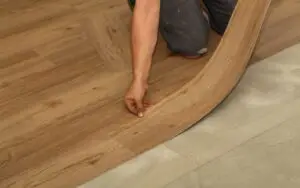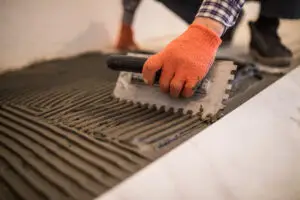Understanding Budget Flooring Options
Factors That Influence Flooring Costs
Material Costs
Material costs are the primary factor that will influence the overall cost of your new flooring project. Materials like hardwood, and natural stone, are much more expensive than other alternatives, like sheet vinyl, and laminate. This means that to save money, you will most likely want to avoid the more expensive options, and choose materials that are known for being both affordable, and durable.
Installation Costs
Installation costs also need to be factored in, and this will usually involve the labor that is required to install the new floors, and any steps that are needed to prepare the area, before the new floors are installed. It is also often recommended to hire a professional to ensure that all aspects of the installation are completed correctly, so you get the most value for your money.
Long-Term Maintenance
When choosing your new flooring, you also need to think about the long-term maintenance that it will require. Some flooring options are much easier to care for than others, and this can have a major impact on your budget. Low-maintenance flooring will save you time and money, and will often last longer than some of the other options.
Balancing Cost and Value
Prioritizing Durability
When it comes to cheap flooring, it’s important to balance cost with the durability of the material. While it’s tempting to go with the absolute cheapest option, it may not hold up well over time, and you may end up having to replace it sooner than you would like. This can often lead to more expenses in the long run.
Choosing the Right Style
It’s also important to choose the right style for your space, when selecting cheap flooring. While the budget is important, you also want to choose flooring that you will like the look of, and that will also blend well with your existing decor. Choosing a stylish material, will also help to add value to your home.
Top Cheapest Flooring Materials
Sheet Vinyl
Cost and Durability
Sheet vinyl is often the least expensive flooring option, and it can cost as little as $0.50 per square foot. While it may not be the most luxurious option, it is durable, and it is also very easy to clean, which makes it a great choice for many homeowners.
Installation
Sheet vinyl is also relatively easy to install, which makes it a great option for DIYers, or for those who want to save money on labor costs. However, it is still wise to hire a professional to ensure the best result.
Pros and Cons
Pros: Very affordable, water-resistant, easy to clean
Cons: Limited style options, can be easily damaged
Laminate Flooring
Cost and Durability
Laminate flooring is another budget-friendly option, that offers a good balance between cost, and durability, and can provide years of reliable use. Laminate flooring can range in price from $1 to $5 per square foot, depending on the quality, and thickness of the material.
Installation
Laminate flooring is also relatively easy to install, which makes it a good option for DIYers. The planks simply click together, and require minimal tools for installation.
Pros and Cons
Pros: Affordable, stylish, easy to install
Cons: Not as water-resistant as vinyl, can be prone to scratching
Carpet
Cost and Durability
Carpet is a versatile flooring option, that is available in a wide range of prices, and styles. The material costs for carpet can range from $1 to $7 per square foot, depending on the fiber type, and the construction.
Installation
Carpet installation typically requires professional installation, due to the need for specialized tools, and techniques. This will add to the overall cost, but it will also ensure that the carpet is installed correctly, and will last for as long as possible.
Pros and Cons
Pros: Affordable options available, comfortable, warm
Cons: Can stain easily, requires regular cleaning, may not be suitable for all areas
DIY vs Professional Installation: Cost-Effectiveness
DIY Installation
Potential Savings
The main benefit of DIY installation is that you will save on labor costs. If you are able to install the flooring yourself, you can save a significant amount of money, however, you should also be aware of all of the potential risks, and problems, that can arise during a DIY install.
Challenges
DIY flooring installation also comes with a number of challenges, such as the need to purchase or rent tools, the potential for mistakes, and the risk of injuring yourself. Because of all of these issues, it is often best to hire a professional, for these types of projects.
Professional Installation
Expertise and Efficiency
Professional installers have all of the expertise, and knowledge, to complete the project quickly and efficiently, and to also ensure that it is done correctly. They will also be able to handle any unexpected problems that may arise, and will always stand behind the quality of their work.
Long-Term Value
Hiring a professional installer can also provide long-term value, as they will use the proper techniques, and materials, to ensure that your new floor lasts for many years to come. They will also offer warranties, which will give you peace of mind, knowing that you are protected from any unexpected issues.
Maintenance and Upkeep
Cleaning Tips for Budget Flooring
Regular cleaning is essential for keeping your budget flooring looking its best, and you should always follow the manufacturer’s recommendations for cleaning products, and techniques. You should also avoid using harsh chemicals, or abrasive cleaners, as these can damage the surface of the flooring.
Extending Lifespan
To extend the lifespan of your budget flooring, you should also take some protective measures, such as using rugs and mats in high-traffic areas, and avoiding excessive moisture. You should also promptly clean up any spills, to prevent staining, and damage to the flooring.
Case Studies: Budget Flooring Success
Example of Cost-Effective Vinyl
A homeowner chose sheet vinyl flooring for their kitchen, and hired a professional installer, to ensure that it was installed correctly. The vinyl was both durable, and easy to clean, and the homeowner was very pleased with the overall look, and value.
Example of Affordable Laminate
Another homeowner installed laminate flooring in their living room, and they were also able to find a budget-friendly option, that met their needs. The laminate was stylish, durable, and also easy to maintain, and the homeowner was very happy with the affordable price point.
FAQs & Answers
Sheet vinyl flooring is generally considered the absolute cheapest type of flooring to install in a home, because it has a low material cost, and is relatively easy to install. However, the overall costs can also depend on your specific location, and also on whether you choose a DIY install, or if you hire a professional. Professional installers are very familiar with budget-friendly materials, and can always help you find the best options for your specific needs.
The cost of sheet vinyl is usually lower than both laminate and carpet, due to the fact that the material is often less expensive, and the installation is often simpler. There are also budget options for both laminate, and carpet, but sheet vinyl will almost always be the cheapest of the three. Professional installers can help you make a decision based on all of the costs, and will also provide a high-quality installation, that provides you with the best overall value.
The primary benefits of choosing the least expensive flooring options, is the obvious cost savings, which can help you stay within your budget, and complete a project without breaking the bank. However, the drawbacks often include reduced durability, limited style options, and a shorter lifespan, which may mean you will need to replace the flooring more often. Professional installers are experts at balancing these factors, to create a budget friendly option, that still provides a great deal of value.
Homeowners should always consider the long-term maintenance requirements, when selecting a budget friendly flooring option. Some cheap flooring options, such as low-quality carpet, may require more frequent cleaning, and can also be more prone to damage, which can lead to higher maintenance costs, and the need for sooner replacements. Professional installers can also help you to perform all of the necessary maintenance steps, and protect your investment for many years to come.
While DIY flooring installation might seem like a way to save money, it often comes with hidden costs such as the need to purchase or rent specialized tools, the potential for mistakes during the installation process, and the lack of a professional warranty. Professional installers will protect you from all of these issues, and will also guarantee their work with a warranty, which makes them the best choice for most homeowners.





